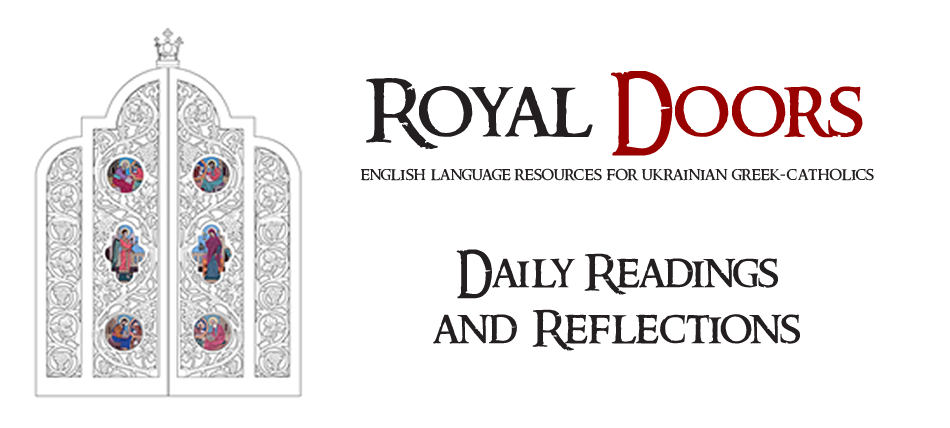by Brent Kostyniuk
Some years ago, a new priest in our parish caused a great stir when he delivered his first sermon—he brought a Bible with him to the pulpit. Not only did he bring a Bible, but he also quoted passages from it as he preached. “What’s going on here? Is he trying to turn us into Protestants? We are Catholic, we don’t read the Bible in church.”
In fact, just the opposite is true. The Divine Liturgy of St. John Chrysostom draws heavily on Holy Scripture, both directly and indirectly. While this may be surprising to some, it is well worth investigating. Not only will it help us to understand the Divine Liturgy more fully, but it may also help us to appreciate the Divine inspiration which, surely, played a role in its creation.
Biblical references in the Divine Liturgy might be classified into two main groups: those which are direct quotes; and, those which draw from scripture but not necessarily verbatim.
The Epistle and the Gospel
In the first group, the main ones are the Epistle and Gospel readings. As they are introduced as readings from a particular book of the New Testament, the association is obvious. There are other, less obvious biblical quotations in the Divine Liturgy. The Third Antiphon is often replaced with the Beatitudes as recorded in Matthew 5:3-12. “Blessed are the poor in spirit, for theirs is the kingdom of heaven…” As well, the Prokeimena are excerpts from the Psalms, although not actually noted as such. “You, Lord, will keep the needy safe and will protect us forever from the wicked” (Psalm 12:7). “Save your people and bless your inheritance; be their shepherd and carry them forever” (Psalm 28:9). “Sing praises to God, sing praises; sing praises to our King, sing praises” (Psalm 47:6). “The Lord is my strength and my defense; he has become my salvation” (Psalm 118:14) And finally, “The Lord has chastened me severely, but he has not given me over to death” (Psalm 118:18). While not a complete compilation of the Prokeimena, these examples give a taste of the praise they offer. They are as relevant today as when they were written by King David about 1000 BC.
The Divine Liturgy
The author(s) of the Divine Liturgy were obviously well acquainted with scripture and readily drew on it for inspiration and content. Often, several biblical passages were sourced to form a new prayer. The first of the these is the Opening Doxology, “Blessed is the Kingdom of the Father, and of the Son, and of the Holy Spirit, now and ever, and forever. It combines elements of four pericopes: “Blessed is the coming kingdom of our father David!” (Mark: 11:10); “And I confer on you a kingdom, just as my Father conferred one on me” (Luke: 22:29-30); “Therefore go and make disciples of all nations, baptizing them in the name of the Father and of the Son and of the Holy Spirit” (Matthew: 28:19); and, “…saying: ‘Amen! Praise and glory and wisdom and thanks and honor and power and strength be to our God for ever and ever. Amen!’” (Revelation: 7:12).
At the Elevation of the Holy Gifts, the words, “Holy Things to the holy! One is holy, One is Lord, Jesus Christ, for the glory of God the Father. Amen.” come from two sources: “I am the Lord your God; consecrate yourselves and be holy, because I am holy. Do not make yourselves unclean by any creature that moves along the ground” (Leviticus: 11:44); and, “that at the name of Jesus every knee should bow, in heaven and on earth and under the earth, and every tongue acknowledge that Jesus Christ is Lord, to the glory of God the Father” (Philippians: 2:10-11).
The Faithful’s response after Holy Communion is full of profound thanksgiving. “We have seen the true light, we have received the heavenly Spirit, we have found the true faith, and we worship the undivided Trinity, for the Trinity has saved us.” This short prayer is drawn from several biblical passages including: “The true light that gives light to everyone was coming into the world” (John 1:9); “To the angel of the church in Laodicea write: These are the words of the Amen, the faithful and true witness, the ruler of God’s creation” (Revelation 3:14); and, “My mouth is filled with your praise, declaring your splendor all day long” (Psalm 71:8).
The Prayer behind the Ambon, “O Lord, blessing those who bless You…” is one of the most complex prayers, combining themes from nine separate passages including: “I will bless those who bless you, and whoever curses you I will curse; and all peoples on earth will be blessed through you” (Genesis 12:3); “Save your people and bless your inheritance; be their shepherd and carry them forever” (Psalm 28:9); “Lord, I love the house where you live, the place where your glory dwells” (Psalm 26.8); “I will bless those who bless you, and whoever curses you I will curse; and all peoples on earth will be blessed through you” (Psalm 28:9); “…for kings and all those in authority, that we may live peaceful and quiet lives in all godliness and holiness” (1 Timothy 2:2); and, “Every good and perfect gift is from above, coming down from the Father of the heavenly lights, who does not change like shifting shadows” (James: 1:17).
Finally, the often-repeated blessing, “Peace be with you” (John 20:19), are the very words spoken by the Lord when He appeared and greeted the apostles in the sealed room. They are a reminder that as we pray the Divine Liturgy Jesus Christ is very much present.
V. Rev. John J. Matusiak has compiled a list of all biblical quotations and references in the Divine Liturgy. It can be found at: https://www.theophany.org/services-scripture-in-the-divine-liturgy.php

